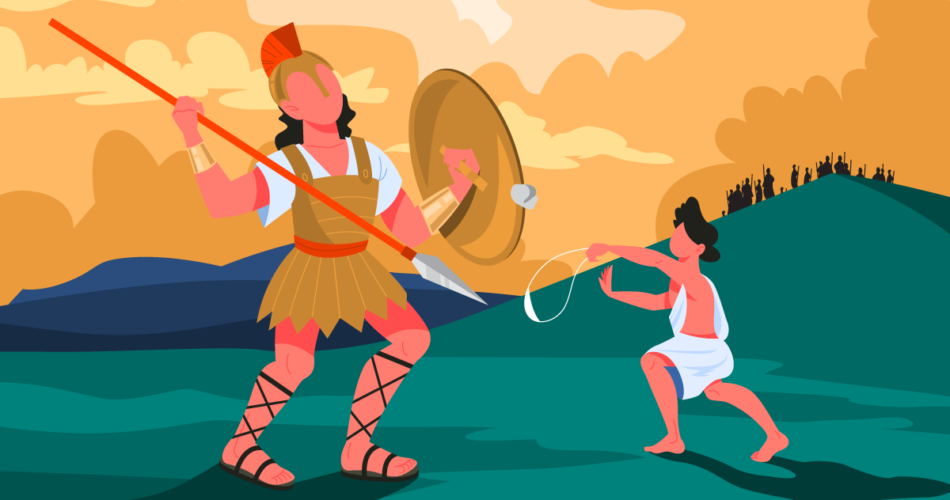Story of the fight between future king David and horrendous warrior Goliath is one of the most interesting confrontations in the Bible.
If we read this story for a first time, we can think that it’s a kind of a fairy-tail for children that doesn’t have any special meaning for us.
However, this story has a really deep meaning…
The question that any reader tries to respond is how small David wins against the giant Goliath?
From the description of Goliath, we can see that he is not just a warrior, but he is a cruel war machine without any empathy or piety. His only concern is to win, to crush his opponent. The narrator doesn’t tell us about his personality because he knows only battlefield and war is his only purpose in the life.
David is a total opposition of Goliath. He is a pastor of his father’s flocks. The last son in the family, he is not a warrior like his elder brothers. His concern is not to win but to protect his flocks from any danger.
The personality of pastors presupposes the logic of relationship between himself and his flock. In contrary for warriors or hunters that should dominate over the animals, the pastors should enter in relationship of trust and confidence with their animals to receive from them milk and wool. In exchange, humans guarantee their safety from wild animals and feeding.
What does it mean for the comprehension of our story?
This means that David and Goliath have different logics one from another. Goliath has logic of a warrior that wants dominate his enemy. David has logic of a pastor that wants to protect and guarantee security to his flocks.
Another interesting detail about this story is the context of this fight. When David arrives, the Hebrews and their king live in the military camp for the long time. All the army is terrified in front of their enemy Goliath. They can’t even imagine fighting with this giant.
Like Goliath, they have the same logic of warrior. They can evaluate that he is the strongest man, and nobody can fight and win against him. According to this logic, the strongest wins.
So, Hebrews are blocked with their logic of warriors, their fright of giant and lack of confidence in God.
David lives in another context. He is not a warrior; he is a pastor. Unlike his brothers that live in the army, he lives with his father. He passes his days in the fields with flocks.
He comes in the camp as a visitor. He brings food to his brothers from home.
When he comes, he hears about the proposition of the fight with Goliath.
He is a freshman in this common feeling of terror. He came from another context, from another style of life. For this reason, he is not terrified by Goliath as others.
We can presuppose that he accepts to fight Goliath because of four factors.
- He doesn’t understand who he’s dealing with.
- He has a logic of pastor and not of warrior.
- He is selfish a young man that wants to use an opportunity to fight.
- He trusts in God.
Probably, the four factors could influence the David’s choice.
We can’t be sure why he wants to fight, but he accepts this challenge.
Saul doesn’t believe that David can win but he has no choice in this ridiculous situation that shows the Hebrew army as a weak nation.
He gives to David his armor. This gesture is symbolic. He foreshadows himself the transfer of his power to the new king, elected by God, the king David.
David looks Goliath not as the strongest warrior but as an animal. An animal that presents a real danger to his flock. He wins over Goliath with pastor’s tool that helps to protect the flow from wild animals.
In this fight, David is a real pastor of his flock. In this fight, David becomes a king of his nation.
Hebrews think that they need the strong king. In reality, they don’t need a warrior but a pastor that will guide and protect them. Saul hasn’t these qualifications.
In this story we can read not only the defeat of Goliath but also the defeat of Saul as a king who couldn’t save his people.
Why it’s David and not Saul that saves the nation? It’s because Saul doesn’t have enough faith and trust in God. David has faith and trust in God. He knows that God will help him.
So, the story of David and Goliath is about changing of viewing angle, the faith and trust in God and a real mission of the governor to be the pastor.
The question that Christians ask themselves in front of every biblical story is how this story can help them in their lives?
What answers this story can bring to our lives?
Every biblical story is about the faith and trust in God. But in this story is not only about the trust and faith in God but also about the faith and trust in ourselves.
As David, we are invited not to be terrified by trials and dangers of life. If we are stuck in our current situation, we shouldn’t be terrified as the Hebrew army, but we should change our viewing angle to win over our enemy.
In opposition to pessimism of Hebrew people, David came with his optimism, his determination to win, to guide his flock to God.
In difficult situations, we are also invited to change our viewing angle to win against our enemies.
We can conclude that the story of David and Goliath is about hope and wining in the extreme situations. If only we have faith and determination to change our viewing angle, we can win.
In this period of Lent, it’s important to follow David’s example and not example of desperate Saul that is blocked in his warrior logic.

